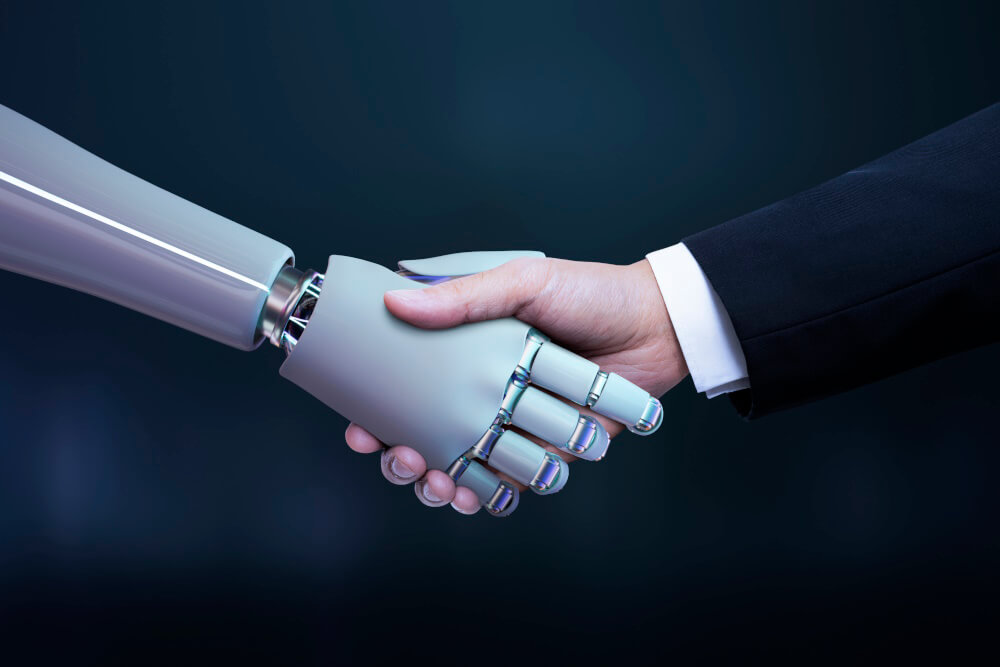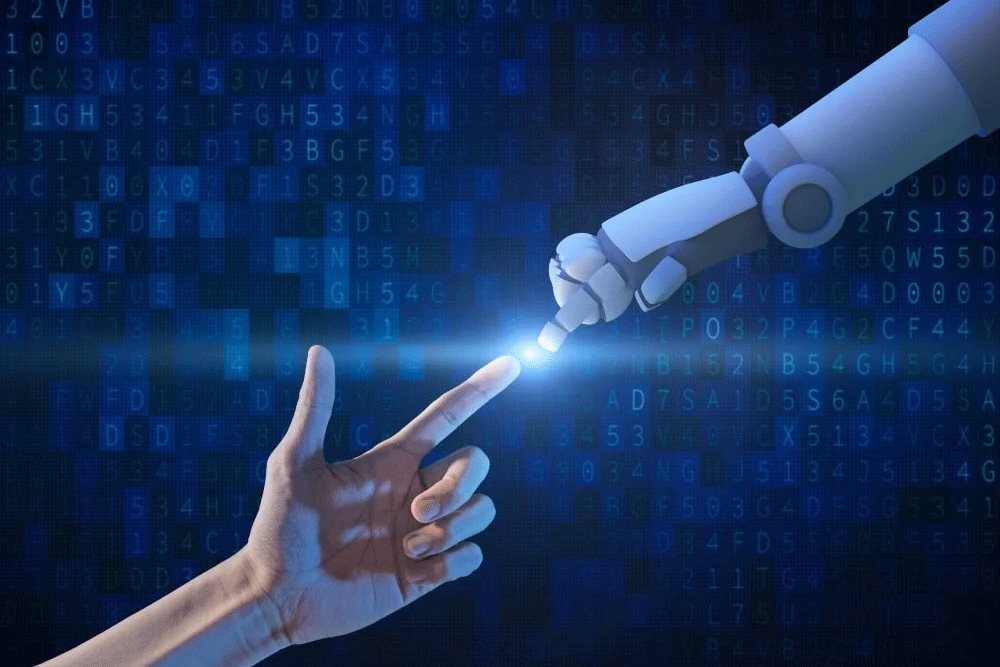The advent of Artificial Intelligence (AI) has revolutionized various sectors and triggered an intense debate: Will AI replace human jobs? This question, although simple, is layered with complexities that need nuanced understanding and insights. Here, we will explore this question, providing tangible examples and discussing how humans can leverage AI to improve their work, potentially change industries, and create new opportunities.
The AI Job Debate: An Overview
The debate surrounding AI’s impact on employment is one of complexity and nuance. The fear that AI and automation will supplant human jobs is not without basis, as technology’s advancement undeniably enables machines to perform previously exclusive tasks. This is especially true for jobs primarily of routine and repetitive tasks. From manufacturing assembly lines to basic data entry, these tasks are prime candidates for automation due to their predictability and uniformity. AI can execute these tasks more quickly, accurately, and tirelessly than humans, making it a cost-effective choice for businesses.
However, this discussion is more complex than it might appear. It is essential to understand that jobs typically encompass an array of tasks, many of which require human abilities such as creativity, empathy, or complex problem-solving—traits that AI, despite its impressive progress, has yet to master. For instance, while AI might assist a doctor by analyzing patient data and suggesting potential diagnoses, it cannot replace a doctor’s empathy when delivering difficult news to a patient. Similarly, an AI tool might generate a draft report based on data, but it would still require a human to interpret the data contextually and draw meaningful conclusions. Thus, while AI may change the nature of work and displace certain jobs, it also creates opportunities for new roles that leverage human capabilities with AI’s computational strengths.
Example: In the banking sector, AI-powered chatbots can handle routine inquiries, but they cannot replace the need for human bankers who handle complex queries, offer financial advice, or build customer relationships.

Can AI Replace Any Industry?
Artificial Intelligence’s (AI) capability to automate specific tasks has significantly changed many industries. However, its potential to entirely replace jobs is not uniform and varies greatly depending on the sector and job role. Industries heavily reliant on routine, predictable tasks are more susceptible to automation. Conversely, jobs requiring creativity, emotional intelligence, strategic thinking, or hands-on skills are less likely to be entirely supplanted by AI. Even within industries, there are gradations of AI’s impact, with certain roles more prone to automation than others. Ultimately, while AI undoubtedly influences how we work, it is not poised to replace entire industries but instead change the nature of jobs within them.
Creative Content
The capacity of AI to generate content has been a transformative development in the realm of creative industries. AI algorithms can now write articles, generate artwork, compose music, and even create movie scripts. These algorithms learn from vast datasets they are trained on, extrapolating patterns, styles, and structures from these data to create new content. However, AI’s creative prowess has certain limitations. Essentially, it is constrained by the data it is trained on, meaning its ‘creativity’ is derivative rather than original. It can only mimic patterns it has already seen and cannot truly innovate or introduce a novel concept or style that hasn’t been part of its training data.
Furthermore, AI is inherently devoid of the human touch that often distinguishes truly great creative works. The cultural context, emotional intuition, and out-of-the-box thinking that humans bring to the table are currently beyond the grasp of AI. It cannot understand the nuances of human emotion or the subtleties of cultural contexts that deeply influence creative content. For instance, AI can write a poem by mimicking the structural elements it has learned from its training data. Still, it cannot infuse poetry with genuine feelings or understand the cultural implications of certain metaphors. While AI is an impressive tool that can assist in creative endeavors, it remains a tool guided by human insight, intuition, and imagination. This symbiotic relationship between human creativity and AI’s capabilities will define the future of creative content.
Example: OpenAI’s GPT-3 can write essays, poems, and even code, but it can’t match the emotional depth, cultural understanding, or creativity of a human writer, poet, or coder.
Web Design
Artificial Intelligence has made considerable strides in web design, providing tools to automate creating websites based on predefined templates. These AI tools can parse user input, choose appropriate templates, and populate them with relevant content. They can also handle basic design elements such as color schemes, layouts, and typography based on best practices and popular trends. This capacity for automation is a boon, particularly for small businesses and individuals who may not have the resources to hire a professional web designer, allowing them to establish an online presence quickly and cost-effectively.
However, the capabilities of AI in web design have their limitations. AI tools cannot replace human designers when creating unique, brand-specific designs or deeply understanding user experience. A human designer brings an understanding of a brand’s personality and can create a bespoke design that truly reflects the brand’s ethos and appeals to its specific audience. Moreover, they can intuitively grasp user behavior and preferences, adjusting the design to ensure an optimal user experience. AI, on the other hand, lacks the ability to understand the nuances of brand identity or the emotional aspects of user experience. Despite AI’s significant advances in automating web design, the human touch in creating truly unique and engaging websites remains irreplaceable.
Example: Tools like Wix ADI (Artificial Design Intelligence) can create websites using AI, but they cannot replace human web designers’ expertise, creativity, and intuition.

Healthcare
Artificial intelligence has made significant inroads into healthcare, offering various tools to aid medical professionals. In particular, AI has shown promise in areas such as medical imaging and patient data analysis. Machine learning algorithms can examine hundreds of thousands of images or data points, identifying patterns and anomalies that could indicate disease. For instance, AI tools can analyze mammograms or MRI scans, helping radiologists detect cancer at early stages or predict health risks by examining patterns in a patient’s electronic health records. AI can speed up the diagnosis process, increase accuracy, and potentially catch conditions before they become critical.
As with other sectors, the role of AI in healthcare is not one of replacement but assistance. While AI can process vast amounts of data and spot patterns with remarkable efficiency, it cannot replicate the experience, intuition, and empathy human doctors bring to patient care. Medical decisions often require nuanced judgments based on years of experience and an understanding of the individual patient’s context and history, something that AI, with its reliance on data and algorithms, can’t fully replicate. Furthermore, the patient-doctor relationship is founded on empathy and understanding, where a doctor’s ability to connect with a patient on a human level can make a substantial difference in the patient’s journey. Hence, while AI can serve as a valuable tool in healthcare, it does not replace irreplaceable—human medical professionals.
Example: IBM Watson can analyze patient data and suggest treatment options, but it can’t replace a doctor’s years of training, experience, and emotional intelligence.
Partnering with AI: The Future of Work
The narrative surrounding artificial intelligence (AI) and its impact on jobs often veers towards apprehension, primarily driven by concerns about job displacement. However, viewing AI not as a threat but as an opportunity to augment and enhance our work may be more constructive. A partnership with AI presents the potential to automate mundane, repetitive tasks, thereby liberating workers to engage in more meaningful, stimulating tasks. Furthermore, AI’s capacity for processing vast amounts of data and making complex calculations far surpasses human abilities, leading to improved accuracy in fields ranging from healthcare diagnostics to financial forecasting.
Such a collaborative approach between humans and AI underscores the value of uniquely human skills that AI cannot replicate. Even as AI evolves, it cannot match human creativity, emotional intelligence, and critical thinking. These attributes are vital in areas like strategic decision-making, problem-solving, innovation, and connecting with customers or patients on a personal level. While AI can provide data-driven insights or automate routine tasks, interpreting these insights and the final decision-making power, remain firmly in the human domain. As we move towards the future, a synergistic combination of AI capabilities with human skills could reshape the world of work, elevating productivity, innovation, and job satisfaction.
Example: In the legal profession, AI tools like ROSS can automate legal research, but they can’t replace lawyers who use their judgment, persuasion skills, and ethical understanding to argue cases and advise clients.

AI: A Catalyst for Job Creation
The discourse surrounding AI and employment often focuses on job displacement, as AI has the potential to automate routine and repetitive tasks across various sectors. However, it is equally essential to consider AI as a catalyst for job creation. The advent of AI technology, much like any transformative technology, also leads to the emergence of new jobs and fields that we might not fully conceive of today. The pattern of technological advancements creating new forms of employment is not new. For instance, the rise of the internet led to jobs in fields like social media management, search engine optimization, and data science – roles unimaginable a few decades ago.
Similarly, as AI continues to evolve and become increasingly integrated into our society, it will likely foster the creation of new roles that harness its potential. These could range from AI ethics consultants who ensure the responsible use of AI, AI trainers who teach AI systems to understand and learn from human behavior, or even jobs we haven’t yet conceived. These roles will require a blend of technical proficiency and human skills like problem-solving, creativity, and ethical judgment. While AI may change the work landscape and render certain tasks obsolete, it simultaneously opens up opportunities for novel professions and industries, reshaping the job market.
Example: As AI becomes more integrated into businesses, roles like AI Ethics Officer, AI Trainer, or AI Maintenance Worker are emerging, and these were unimaginable a few years ago.
So, will AI replace your job? It might replace certain tasks, but it’s unlikely to replace jobs that require human skills. More importantly, AI presents an opportunity to reimagine work, automate the mundane, enhance human skills, and create new opportunities. The key is continuously learning, adapting, and finding ways to partner with AI to harness its benefits. This mindset will not only future-proof your career but also open doors to exciting new opportunities in the AI-driven world.

